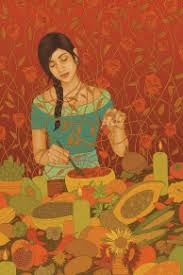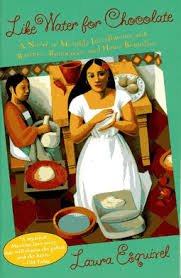Literary Character: Tita de la Garza
Book: Like Water for Chocolate (1989)
As India celebrates Daughter’s Day today, I am reminded of Tita de la Garza, who remains one of the most interesting literary characters in the history of magical realism and Spanish literature. Tita, the youngest daughter of the Garza family, is the central protagonist of Laura Esquivel’s ‘Like Water for Chocolate’. Tita is unique because of her unusual destiny and also because of her sixth sense. Her unusual destiny is linked to her family tradition that does not permit her to get married being the youngest daughter of the family; she is expected to look after her mother till her death. Her sixth sense enables her to infuse her emotions into the dishes that she cooks. As a result, her feelings get transferred to the people who eat the food cooked by her. Thus, her suppressed emotions get ventilated through other people, and she lives vicariously through the fulfilment or expression of those feelings.
Tita is an immensely sensitive and empathetic character. She is perceptive, intuitive and has a sad life though endowed with a special power. She has a deep connection with the kitchen and the dishes she cooks. Esperanza describes her aunt Tita’s birth: “And before my great grandmother could let out a word or even a whimper, Tita made her entrance into this world, prematurely, right there on the kitchen table amid the smells of simmering noodle soup, thyme, bay leaves and cilantro, steamed milk, garlic and of course onion.” Tita’s life revolves around the kitchen with the house cook Nacha. Her childhood and young adolescence are spent playing amid preparation of food items and recipes in the kitchen along with Nacha. She does not have much of an idea beyond her own little world in the kitchen:

“Together [with Nacha] they made up all sorts of games and activities having to do with cooking. Like the day they saw a man in the village plaza twisting long thin balloons into animal shapes, and they decided to do it with sausages. They didn’t just make real animals, they also made up some of their own, creatures with the neck of a swan, the legs of a dog, the tail of a horse, and on and on.”
Beyond the realm of the kitchen, the world was strange to her till she met Pedro Muzquiz who made her weave dreams outside her own threshold.

Tita has an unconventional tie with her mother Elena de la Garza. It is a stiff relationship. Her excessive dominance on every aspect of her life makes Tita feel like a prisoner in her own home. Though usually a timid person, Tita once tries to reason with her mother and question her family tradition. But her mouth and inquisitive spirit are ruthlessly curbed: “You don’t have an opinion, and that’s all I want to hear about it. For generations, not a single person in my family has ever questioned this tradition, and no daughter of mine is going to be one to start.” Her mother is merciless enough to fix the marriage of Tita’s oldest sister Rosaura with Pedro, the man Tita loved a lot. Tita has a mind that does a lot of introspection but she does not have enough guts to express those. Perhaps, these questions, suppressed and bubbling in the cauldron of her mind, give rise to her sixth sense. About the family tradition, she thought:
“For one thing, she wanted to know who started this family tradition. It would be nice if she could let that genius know about one little flaw in this perfect plan for taking care of women in their old age. If Tita couldn’t marry and have children, who would take care of her when she got old? Was there a solution in a case like that? Or are daughters who stay home and take care of their mothers not expected to survive too long after the parent’s death? And what about women who marry and can’t have children, who will take care of them? And besides, she’d like to know what kind of studies had established that the youngest daughter and not the eldest is best suited to care for their mother.”
Tita does not know she has magical powers till the day of Rosaura’s wedding when she bakes a cake with Nacha. The wedding cake has Tita’s tears as a chief ingredient as she sobs continuously while making it in her feeling of loss of Pedro to her sister Rosaura. Whoever has the cake feels overwhelmed and starts crying. Many guests as well as Rosaura – the bride – feel nauseous. She vomits all over her bedding sheet. She is so sick that she cannot consummate her marriage that night. Elena blames Tita for mixing some kind of toxic substance in the cake that made everyone sick. Similarly, Tita’s delicacy of quail with rose petal sauce transfers her feeling of passion and lust for Pedro to her sister Gertrudis who has the dish. In a mad frenzy, Gertrudis runs naked to make love to the soldier Juan Alejandrez. And both Tita and Pedro experience the physical union vicariously: “Like silent spectators to a movie, Pedro and Tita began to cry watching the stars act out the love that was denied to them.”
The novel ‘Like Water for Chocolate’ was adapted into a 1992 Mexican film by the writer’s husband Alfonso Arau. The premise that the cook’s emotional energy is transfused into the dishes she cooks is kept alive in the faithful adaptation. Some critics feel Tita played by Lumi Cavazos did not do justice to her ethereal beauty as described in the book. But then, does not beauty lie in the eyes of the beholder?


